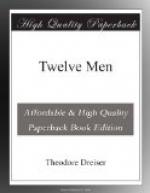I may as well say here that he had no more business skill than a fly. At the same time, he was in no wise sycophantic where either wealth, power or fame was concerned. He considered himself a personage of sorts, and was. The minister, the moralist, the religionist, the narrow, dogmatic and self-centered in any field were likely to be the butt of his humor, and he could imitate so many phases of character so cleverly that he was the life of any idle pleasure-seeking party anywhere. To this day I recall his characterization of an old Irish washerwoman arguing; a stout, truculent German laying down the law; lean, gloomy, out-at-elbows actors of the Hamlet or classic school complaining of their fate; the stingy skinflint haggling over a dollar, and always with a skill for titillating the risibilities which is vivid to me even to this day. Other butts of his humor were the actor, the Irish day-laborer, the negro and the Hebrew. And how he could imitate them! It is useless to try to indicate such things in writing, the facial expression, the intonation, the gestures; these are not things of words. Perhaps I can best indicate the direction of his mind, if not his manner, by the following:
One night as we were on our way to a theater there stood on a nearby corner in the cold a blind man singing and at the same time holding out a little tin cup into which the coins of the charitably inclined were supposed to be dropped. At once my brother noticed him, for he had an eye for this sort of thing, the pathos of poverty as opposed to so gay a scene, the street with its hurrying theater crowds. At the same time, so inherently mischievous was his nature that although his sympathy for the suffering or the ill-used of fate was overwhelming, he could not resist combining his intended charity with a touch of the ridiculous.
“Got any pennies?” he demanded.
“Three or four.”
Going over to an outdoor candystand he exchanged a quarter for pennies, then came back and waited until the singer, who had ceased singing, should begin a new melody. A custom of the singer’s, since the song was of no import save as a means of attracting attention to him, was to interpolate a “Thank you” after each coin dropped in his cup and between the words of the song, regardless. It was this little idiosyncrasy which evidently had attracted my brother’s attention, although it had not mine. Standing quite close, his pennies in his hand, he waited until the singer had resumed, then began dropping pennies, waiting each time for the “Thank you,” which caused the song to go about as follows:
“Da-a-’ling” (Clink!—“Thank you!”) “I am—” (Clink!—“Thank you!”) “growing o-o-o-ld” (Clink!—“Thank you!"), “Silve-e-r—” (Clink!—“Thank you!”) “threads among the—” (Clink!—“Thank you!”) “go-o-o-ld—” (Clink! “Thank you!"). “Shine upon my-y” (Clink!—“Thank you!”) “bro-o-ow toda-a-y” (Clink!—“Thank you!"), “Life is—” (Clink!—“Thank




